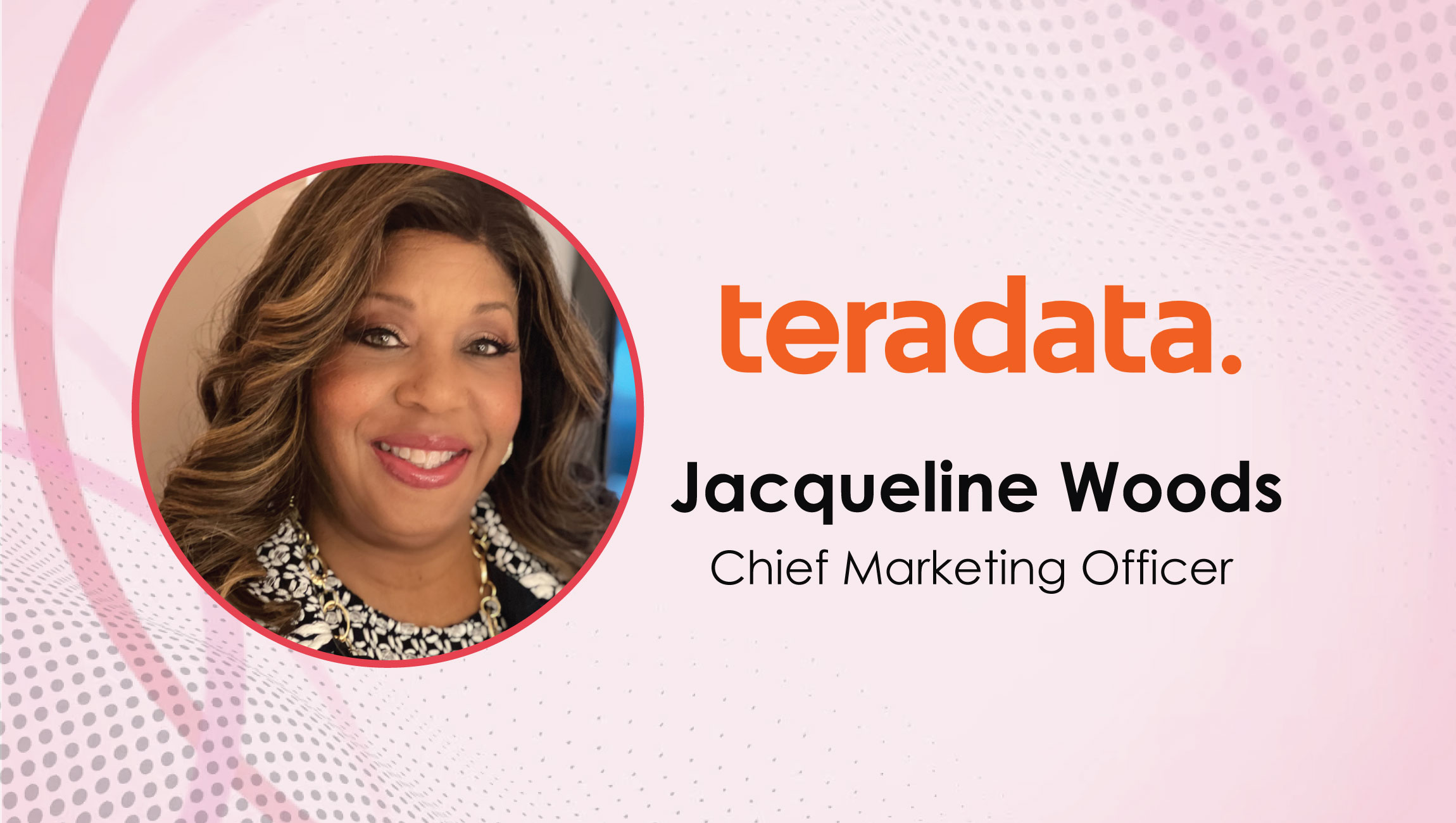From the impact of AI on the future of marketing to the challenges marketers face when scaling personalization tactics; Jacqueline Woods, CMO at Teradata discusses what’s influencing and driving B2B tech marketing in this short Q&A:
___________
Welcome to this MarTech Series chat, Jacqueline – tell us about your marketing journey and more about being CMO at Teradata. What about today’s state of B2B tech marketing excites you most?
My first ever marketing experience was selling Girl Scout Cookies. It made me interested in what motivates people to buy things and the importance of truly believing in your product and its value. I could always get people to buy from me – that was when it was safe to go door-to-door, literally. Even being the top fundraiser for the “march of dimes” in my teens, and then again when I was in my early 20’s and ranked as a top 10 fundraiser for UNCF in the Western Region, meant that I had learned to bring passion and conviction to the whatever I was doing.
So, when I started my professional career in finance and accounting because I love numbers and data, I knew that there was a way to apply those skills to the beginning of the story and not the end. Accounting and Finance focus on the results – what happened and why it happened – whether that is good or bad. It is after the fact – the deals are won, the books are closed, nothing more can be done other than to describe the outcomes and the reasons for them.
But before the books are closed, before a rep has contacted anyone, there is something that catches your prospect’s attention, their curiosity raised – something that makes them want to learn more and it always starts with a story, a reason why, a reason to consider, a reason to believe. There is something intriguing about using data, information, and intelligence to help you tell a better story to the right people to help them consider your company’s product. That was particularly true with “POTS,” plain old telephone service — dial tone or phone connectivity is something that you can’t see, taste, or feel, but why are we so dependent on it? For more than 100 years, since the original technology was introduced, our everyday experiences rely on it – for safety, security, connection, engagement, and more.
Helping people understand the importance of connection and connectivity is still the fundamental role of telecom carriers. And with the advent of wireless and smart phones and other connected devices, this connectivity is still odorless, tasteless, has no smell, is unseeable, and untouchable, but is more important than ever to everyday existence and its connectivity is pervasive to everything.
Those early experiences prepared me for conviction and how to tell stories, which ultimately helped me get ready for my current role as Chief Marketing Officer at Teradata where I’m focused on storytelling around AI and analytics. I love that every day I get to think about how people use data, insights and AI to improve their businesses. When I was at IBM, we had an initiative we did with our ecosystem partners called Watson Build. Partners built on AI technology and competed against other teams globally. Some of my most memorable moments were of a firm that was able to use their technology for early detection of forest fires. The company used AI to understand patterns and the differences in real time camera footage to quickly identify whether the changes spotted were due to a fire and if so, the system used intelligence to predict its path given climate conditions, and how to quickly address it and hopefully save people, animals, and the forest. That is the power of AI.
With B2B tech marketing today, we’re at an interesting inflection point. The way people think about brand and the landscape for doing business has changed dramatically because of AI. That forest preservation technology was one example, but there are 100’s of use cases. Because of that, companies need more and more data, and data they can trust, to make better decisions and better serve their customers and their business.
This continues to be an area that excites me, even after all these years…
Take us through some of your core marketing strategies at Teradata and the martech that helps drive all of it?
My strategy first entails looking through the lens of the three core goals that our customers have: improving business performance, the holistic customer experience, and innovation around products and services.
At Teradata, we’ve doubled down on two things recently. First, a strong account-based marketing strategy and process. And second, leveraging our digital presence with a strong website. I like to say that Teradata.com is the number one employee at the company. It’s on 24 hours a day, seven days a week, and 365 days a year, and it speaks on our behalf when we’re not able to. We recently did a wholesale transformation of the website and how content is delivered. As a result, we’re now seeing engagement up more than 100% with people staying on the website three times longer than before.
How are you using the latest in AI to drive further business impact and marketing goals?
There are many ways we’re using AI in marketing at Teradata. This includes using AI and predictive analytics to identify new potential accounts and enhance our understanding of what prospects care most about and their intent signals. We’re also using conversational AI to enhance real-time conversations with customers such as connecting a buyer to sales or support, answering product questions, or recommending content that a buyer might find helpful. We’re also exploring more ways to use AI for website personalization and testing.
Marketing Technology News: MarTech Interview with Gagandeep Singh, Vice President of Global Marketing at Blancco Technology Group
What in your view should B2B marketing leaders be doing more of in 2024 to drive actual business ROI and support business and sales pipelines more effectively?
First and foremost, as a B2B marketer, we need to be thinking about the customer’s customer. Of course, your customer’s business matters, but what they care about most is their customer, so I make that a priority focus of mine, as well.
Personalization has become even more important than it was a few years ago. Everyone has an idea of what digital experiences should feel like and how they expect to engage with a business. This means companies need to understand everything from what their customer likes and doesn’t like to how they learn and absorb information and target them in a way that doesn’t feel intrusive. And it isn’t one size fits all. Marketers need to employ different types of strategies across their ecosystem.
To move into the next phase of personalization and provide better, more immersive experiences, I like to ask, ‘how can I reduce friction?’ – across their engagement and interactions. I think about where I can deepen connectivity such as better integration across internal and external platforms, linkages to our partners and partnerships, harmonized content that is purposeful and compelling that they will spur curiosity to learn more about whatever need or problem they want to solve. For a consumer that could mean dry skin, for a business it could mean an integration of data across two separate businesses that sell to the same customer – and they learned that the customer was being bombarded with conflicting offers and messages – not uncommon. In the end, creating a unified customer journey comes down to developing a frictionless experience across all digital domains.
How will generative AI eventually play a more important role in the marketing and martech domain: what are your top thoughts and observations around this?
We’re at an exciting moment with AI and generative AI. It holds the potential to drastically influence and accelerate the value that marketers and marketing can deliver to their organizations, but also businesses and personal productivity.
But the only way generative AI will serve us better is if it’s able to be trusted. That’s why we’re hearing the word ‘responsible’ come up a lot more in conversations around AI. But AI is not responsible or irresponsible. It is technology. AI outputs need to be trusted and people need to be responsible in how they use and create AI tools. Creating an environment of trust around AI will be incredibly important over this next horizon.
It’s also crucial to remember that AI is only as good as the data and information that it is trained on. Imagine washing your clothes in dirty water. Or a plagiarized paper that is online and used as part of the amalgamated response from a Gen AI tool. Both produce dirty results that cannot be relied upon. Clean pristine data is the first stop to making the AI journey a reality. Most companies don’t believe they’re fully prepared yet to make the most of their AI initiatives because of poor data quality, lots and lots data siloes preventing streamlined aggregation, and simply no cohesive organizational structure of the data.
So, ultimately, generative AI can be greatly beneficial in marketing and beyond, but there first needs to be trust, governance, and compliance around it.
Can you talk about some of the leading B2B tech brands you feel have a robust online framework that resonates well with end users: what takeaways from those would you leave us with here?
B2B tech companies, specifically, need to continuously evolve to keep up with the ever-changing landscape and their place within it. I’m proud of the progress we’ve made Teradata to be Cloud first. Other companies I see that have successfully pioneered new strategies are Microsoft and IBM. Both have successfully repositioned themselves to newer growth areas, like Cloud and AI.
I’ll also leave you with another, simpler example. Jeff Goldblum has successfully reinvented himself throughout his career. As the celebrity spokesperson for Apartment.com, a product generally targeted toward younger people looking for their first living space, he is now seen as an unassuming fashion icon. He has a whole new brand image from his initial persona – a nerdy mathematician in the Sci-Fi genre.
Marketing Technology News: Consumers Taking Action: Grocery Shopper Trends That Defined 2023, and How They’re Changing in 2024

Teradata offers the most complete cloud analytics and data platform, including for AI. By delivering harmonized data and trusted AI/ML, they enable more confident decision-making, unlock faster innovation, and drive the impactful business results organizations need most.
Jacqueline Woods is CMO at Teradata
Missed The Latest Episode of The SalesStar Podcast? Have a quick listen here!
Episode 195: Data Best Practices for Modern Marketing and Sales with Ana Mourao, CRM Sr. Manager at Stanley Black and Decker Inc.
Episode 194: AI’s Influence on Travel and Hospitality with Toby Korner, SVP, Digital Marketing at Priceline
Episode- 193: A Chat on AI with Debbie Braney, Vice President, Demand & Brand Marketing at Glassbox











